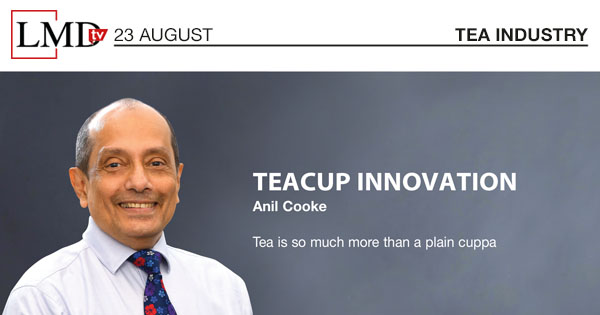
Many storms have been brewing in Sri Lanka’s teacup but Ceylon Tea has remained strong and resilient through it all, from insurrections to pandemics and civil wars to economic downturns.
“In each instance, we have stayed open and relevant, and continued to serve our customers around the world,” the Managing Director and CEO of Asia Siyaka Commodities Anil Cooke stated in a recent LMDtv interview, adding: “A key aspect and unknown value of Ceylon Tea is its ability to deal with problems and continue its engagement with tea drinkers worldwide.”
The ability of the local tea industry to rebound was showcased some years ago with the digital transformation of the age-old tea auction.
Cooke explained: “We had a successful outcry auction system for more than 125 years, which had to reinvent itself and operate during the pandemic. And we did that in under 10 days!”
“We had the genius of software developers, the strategic thinking that abetted the conversion of the thought process into a digital platform, and the willingness and ability of an entire group of people – brokers, buyers and sellers – to go online and buy tea while everyone else in the world of tea was in lockdown mode,” he noted.
As the custodian of a 150-year-old tradition of making orthodox black tea, Sri Lanka is – and should be – keen on expanding value addition avenues where the beverage is concerned.
Cooke stated: “Putting tea in a tea bag is great but having your own brands is far superior. Having a beautifully designed package is good but are you packing it for someone who owns it up the value chain?”
“Sri Lanka has always led the way in terms of innovation,” he asserted, adding that the country is working on areas “that are critical to redefining who we are.”
“If you want to be a leader, you have to behave like one – we can’t wait to be directed by circumstances out there in the world,” he stressed.
Another critical aspect that Cooke highlighted is sustainability: “We need to be sustainable for our own estates, environment and people. For instance, most of the water that services the entire country comes from tea growing areas so we are custodians of all this environmental responsibility.”
Ceylon Tea is known for its quality and mainly targeted at those who would pay a premium since Sri Lanka is a high cost producer, unlike other tea growing nations such as Kenya.
“We have to leverage our markets to offer a better price down the value chain,” observed Cooke, noting that Sri Lanka needs to do more.
He spoke of the new wave of artisanal teas made by specialists that are high in value and small in quantity, like organically grown teas that have been well received by the market: “It will be ideal for sales and engagement with people visiting Sri Lanka.”
Cooke also discussed the relationship between tea and tourism: “These artisanal tea producers will help grow tea tourism. We have high-end five-star boutique establishments that have come up with tea experiences, and people who want to sit in an artisanal tea maker’s cabana, spend a couple of days engaging with the villagers and be part of that experience.”
Many exciting developments are emerging in the industry – including the commercialisation of the patented Ceylon Tea Wine.
“We encourage tea brewing, tea and food pairing, and tea mixology – where we talk about nonalcoholic and alcoholic beverages that you can make from brewed tea as an iced or warm beverage. This innovation is being promoted and encouraged among hotels, cafes and restaurants,” Cooke said.
In his concluding comments, he encouraged all Sri Lankans to embrace the world of Ceylon Tea: “Go to your store, look at the different products and find a niche for yourself. Experience the wide choice of tea based on the part of the country you live in and how it is best brewed in the water from that area.”
“Actively search for tea and learn more about it – become ambassadors of Ceylon Tea,” Cooke urged.



